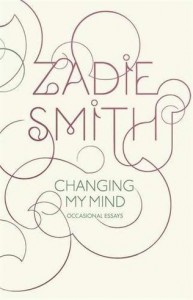 I am embarrassingly late to the works of Zadie Smith, having associated her with a younger generation of writers the literati seemed overly eager to promote. But then I read her essay on Kafka for the New York Review of Books, and listened to various interviews with her on YouTube, and from the ruins of my preconceptions emerged an appreciative reader – of Wodehouse, Kafka, Hurston, and the late David Foster Wallace, to name just a few – whose modesty so obviously belied her talents that a day did not pass before I ran out to a bookstore and picked up Changing My Mind, a collection of her essays. And so it was that I passed quickly from unfair dismissal to unqualified admiration and, inevitably, jealousy.
I am embarrassingly late to the works of Zadie Smith, having associated her with a younger generation of writers the literati seemed overly eager to promote. But then I read her essay on Kafka for the New York Review of Books, and listened to various interviews with her on YouTube, and from the ruins of my preconceptions emerged an appreciative reader – of Wodehouse, Kafka, Hurston, and the late David Foster Wallace, to name just a few – whose modesty so obviously belied her talents that a day did not pass before I ran out to a bookstore and picked up Changing My Mind, a collection of her essays. And so it was that I passed quickly from unfair dismissal to unqualified admiration and, inevitably, jealousy.
The book begins with a quotation from David Foster Wallace’s address at Kenyon College – “You get to choose what to worship” – and ends with a paean to Wallace’s fiction, particularly the collection of short stories Brief Interviews with Hideous Men. It comes as no surprise to learn that Wallace was Smith’s favorite contemporary writer; his influence haunts her prose, from the love of footnoting (Smith exercises more restraint than Wallace) to the parenthetical asides. She shares Wallace’s acute ear, but places greater emphasis on lyricism (more like the Wallace of The Pale King than of Infinite Jest), imbuing whole paragraphs with distinctively beautiful cadences and clever metaphors. To read her pieces on Wallace, Hurston and E. M. Forster is to share in her passions for these writers, but it was the collection’s more personal elements that proved most affecting.
Born of a black Jamaican mother and an elderly, white, British father, elder sister to two younger brothers and a child of divorce, Smith exists at the intersection of various cultural tensions, tensions that form the background (or backbone? – a question she is very much still in the process of answering) of her writing. Thus she presents us with the image of a precocious young girl rejecting her mother’s recommendation of Zora Neale Hurston for no other reason than that Hurston, like Smith, is a black female writer, grounding her relationship to Hurston in the greater conflicts of identity artificially imposed upon her. This same theme informs her popular article on Jay-Z, an excellent primer on what she can achieve in the essay form. And I would be remiss if I did not mention my favorite of her essays, “That Crafty Feeling,” originally conceived of as a speech to a creative writing class (an excerpt of which is available on YouTube); it is the best summation of the writing process, its difficulties and rewards, that I have yet to read, and – though I am a staunch advocate of the written form – it is also beautifully read by Smith, whose accent and intonations must be heard to be appreciated.
When David Foster Wallace, the vanguard of the post-Roth/Pynchon/DeLillo generation, killed himself in 2008, he left behind a void that quite a few critics gloomily predicted would not, could not, be filled. Zadie Smith is the first living writer I have read with the unique combination of intelligence, talent, empathy and ambition capable of proving them wrong.